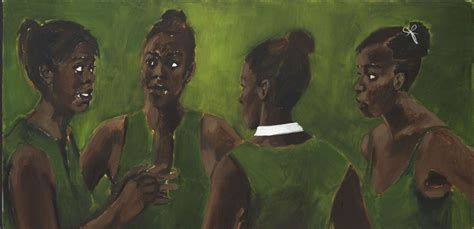A Quote by Megyn Kelly
Obviously, I'm in a visual business, and people will talk to me about my appearance.
Quote Topics
Related Quotes
If you're not mechanically in the community with people from the community trying to talk about our party, talk about school choice, talk about SBA loans for business owners - if someone's not there, nothing is going to change. You also need to have the tone ... people believe obviously you like them. If people don't think you like them, then they're not going to vote for you.
I think it's somewhere in my head, in my travel space, and it just comes out. It's a visual thing that happens unintentionally. People will tell me, "You do realize you just spoke with that accent, right?" And I'll go, "Oh, did I?" So it's not something I think about. As we talk, I have a visual about my speech and it just comes out like that. If that makes any sense!
I've had people hate me for my appearance. I think it gets me a certain level of empathy with the audience. If I was white and handsome and privileged, I probably couldn't talk about what I talk about because people wouldn't believe that I have empathy or I could be evenhanded and objective. It's strange.
If you find common subjects or interests with a prospect, you can establish a business friendship. Ask about a diploma or picture. Your prospect will be glad to talk about what he/she just did or likes to do. Try to captivate him or her in intelligent conversation with engaging questions about their interests. It's obviously better if you're versed in the subject, because that's where rapport is established. Get the prospect to talk about their passions and what makes them happy.
For years, people have been trying to talk to me about doing a show, and I wouldn't do one because I'm a serious business guy. I'm not going to do a stupid show. So, the opportunity came up with CNBC, and we started talking. It became a real business show. It's educational, people watch it, and it's great for small business.
It is like using a smoke screen, the same thing for an individual. The topic here is Islam. If French politicians are no longer talking about Islam, they know they will have to talk about something else, which brings the spotlight on their inefficiency. They will have to talk about domestic social and economic issues and they will have to justify their foreign policy, which is obviously something they need to avoid at all costs.
The written word, obviously, is very inward, and when we're reading, we're thinking. It's a sort of spiritual, meditative activity. When we're looking at visual objects, I think our eyes are obviously directed outward, so there's not as much reflective time. And it's the reflectiveness and the spiritual inwardness about reading that appeals to me.
The health-care law, irrespective of how people feel about the aims of it - and obviously I don't agree with Obamacare - but the worry that some businesses have about how the law will impact their bottom line has made people more apprehensive about expanding and growing their business in the 21st century.
It's hard to pin down what the politics would be, in a way. For me the politics are very visual and felt, thought, seen, but not necessarily put into words. The confusions and conditions within the work are the politics. The fact that a lot of the time the first thing people want to talk to me about is the racial angle, which is a part of the work and I am happy to talk about it, but it's not necessarily the first thing on my mind when I am making something.
If you talk to anyone involved in business - forget banks and big business - talk to small businesses - do it yourself, don't ask me - they'll tell you it's crippling. Small-business formation is the lowest it has ever been in a recovery, and it's really for two reasons. One is regulations and the second is access to capital for people starting new businesses.

































